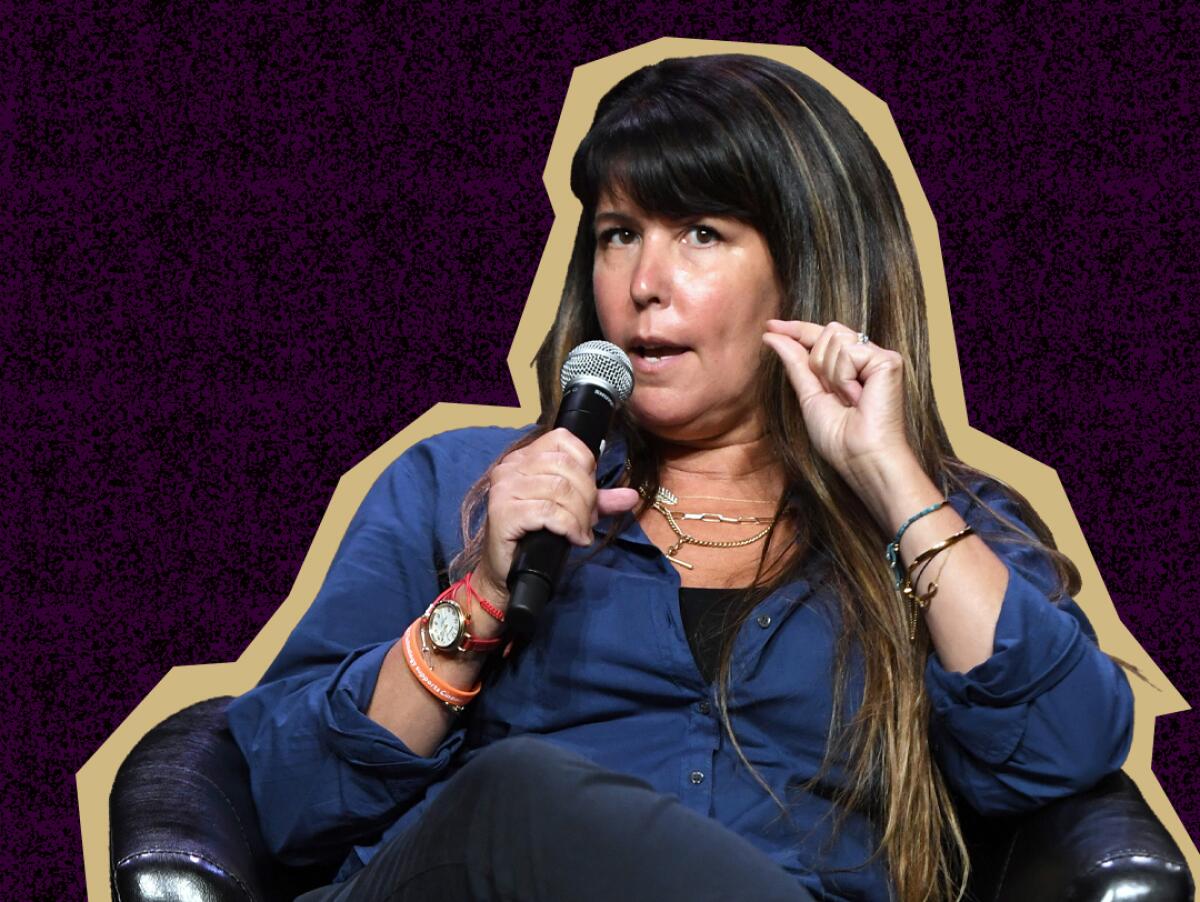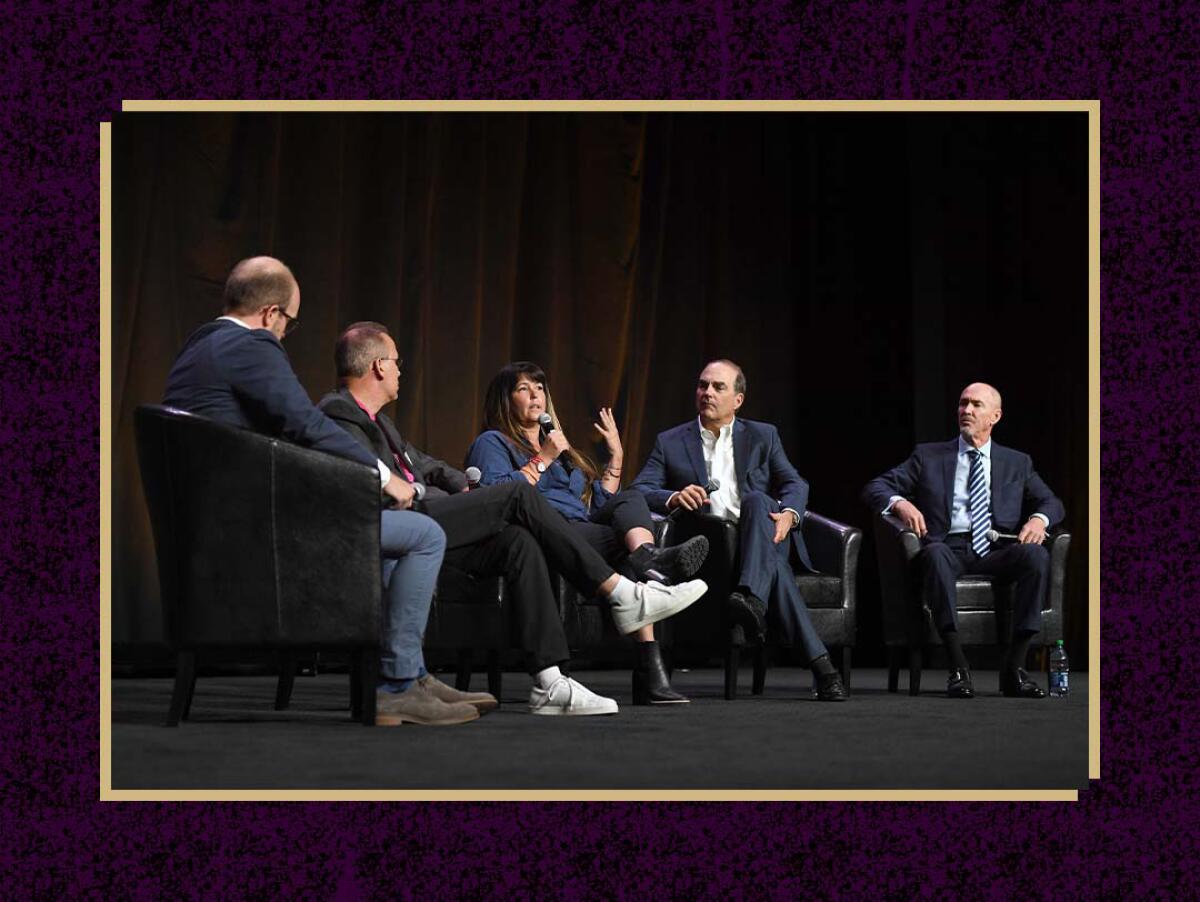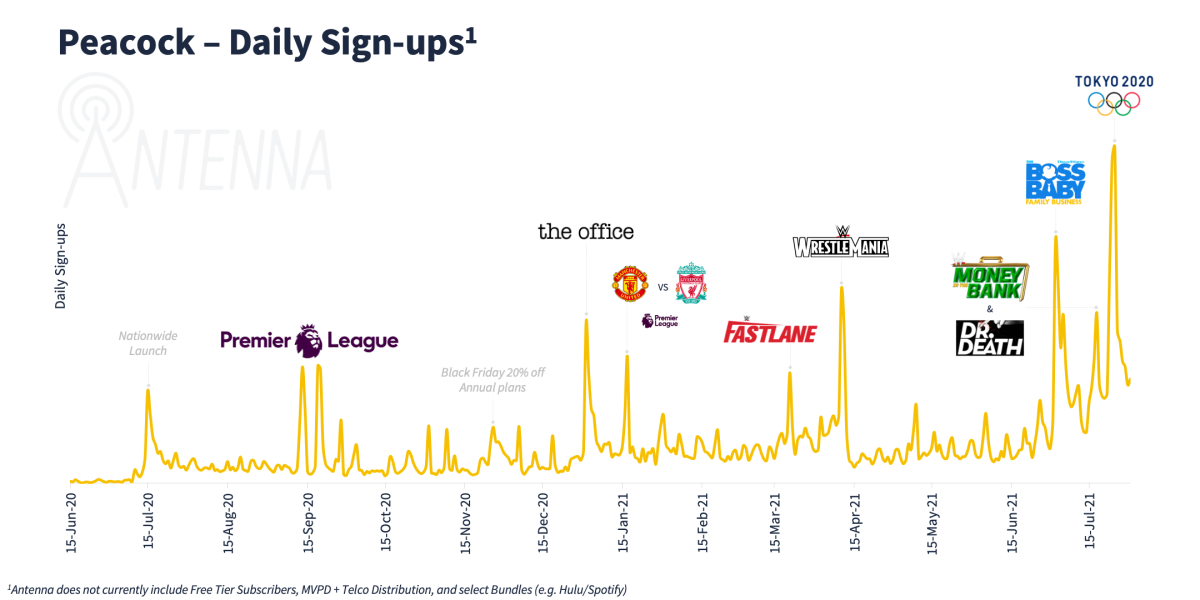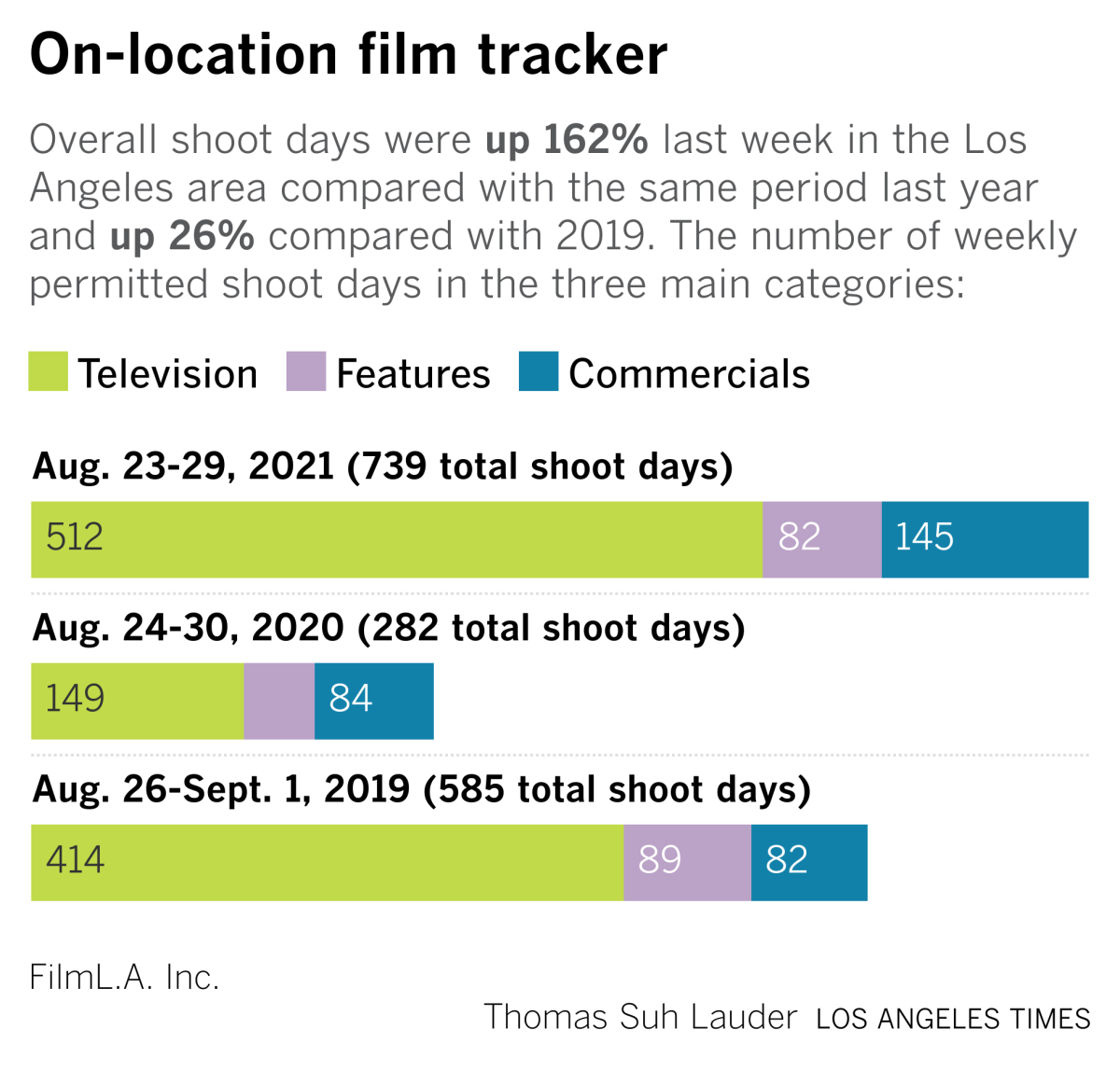Wide Shot: How ‘Wonder Woman 1984’s’ director really feels about streaming movies

- Share via
Given the pandemic’s resurgence because of the Delta variant, it was remarkable that last week’s gathering of theater owners and studio executives in Las Vegas, known as CinemaCon, happened at all. Read our recap here.
During the festivities, the Los Angeles Times hosted a luncheon and panel discussion on the future of cinema, featuring “Wonder Woman 1984” director Patty Jenkins, Paramount Pictures domestic distribution president Chris Aronson, Marcus Theatres CEO Rolando Rodriguez and Cinemark CEO Mark Zoradi.
Jenkins’ comments about the release of the “Wonder Woman” sequel — the first Warner Bros. picture to go to HBO Max and theaters simultaneously (a strategy known as day-and-date release) — got the headlines.
Inside the business of entertainment
The Wide Shot brings you news, analysis and insights on everything from streaming wars to production — and what it all means for the future.
You may occasionally receive promotional content from the Los Angeles Times.
But Jenkins’ message for Hollywood was a broader appeal for studios and theaters to bring massive audiences back to cinemas. She implored studios to stop ceding genres like adult dramas to streaming services. She also didn’t spare theaters themselves, which in her view often fail to live up to the romanticized version of the theatrical experience that CinemaCon promotes.
Box office has a long way to go in its recovery. But as I write this, some movies that aren’t available for streaming are showing signs of life at theaters. Universal Pictures’ “Candyman” reboot, directed by Nia DaCosta, opened with a better-than-expected $22 million domestically. Ryan Reynolds’ “Free Guy” fell a mere 29% week-to-week in the U.S. and Canada, which is outstanding for a mainstream movie.
Here are some highlights from the conversation, edited for length and clarity.
Ryan Faughnder: How can the theatrical business come back as the studios are experimenting with all these different business models with streaming and premium video-on-demand?
Patty Jenkins: I think this is such an interesting period of time because this pandemic struck right when we were at a moment when we were debating this issue anyway. It has been very easy for a lot of people to use the pandemic as an argument pro-something that some of the industry was already trying to do, which is day-and-date.
The truth is, I have thought there was a big misunderstanding of the theatrical industry going on for a long time. In my view, the theatrical industry was always booming and can always be booming if it has diverse content, appeals to all age groups and is a wonderful experience.
And in my lifetime, I have watched diversity of content plummet. You can have six theaters in town, even in Los Angeles, and they’re all playing the same three movies. Quality of the screens has gone way down. I’d say 80% of the time I go into the theaters, the volume is at a 6 or a 5.
The streaming industry has proven that it wasn’t true that adults didn’t want to go see dramas, and that people didn’t want to go see documentaries. They do want to see those all things. I’m going to fight right by your side to keep my films in the theatrical experience and I’m excited for us to bring back the theatrical industry on the other side of this.
Mark Zoradi, Cinemark: Thank you, Patty, for all you’ve done. You said something that was really important, which is that we saw a lot of experimentation at that time. And what we’re seeing now and we’ve been hearing this week, both publicly and privately, is that just about every content provider is back to saying that some form of an exclusive, flexible theatrical window is good for the business.
Chris Aronson, Paramount: I think we have some underlying issues that need to be addressed. It’s the quality of the experience. We’re asking people, we’re exhorting people, to come out of their homes. A year and a half [of] pandemic has changed consumer habits. A lot of the decisions are going to be made on a picture-by-picture basis. I don’t think you’re going to see any slate-long deals anymore like what Warner did with HBO Max, but until we get our business back we have to make some tough decisions. We just do. I think the opportunity for us is, if people aren’t coming to theaters, we need to find out why.
Rolando Rodriguez, Marcus Theatres: There’s a couple of things that really point to what these folks out there are doing on the exhibition side. One is that the large-screen formats are working fantastically. If you look at the percentages and how they’re performing out there, it tells us that, as an industry, we spent a great deal of investment prior to this COVID challenge that we dealt with. Secondly, when you look at the recliner seating investments that have occurred, the food and beverage investments that we made, the technology, clearly the investments are happening. I think the opportunity that we’re all dealing with right now is how do we financially get ourselves back going again? And that takes that partnership between distribution and exhibition.
Faughnder: Does this mean we’re headed toward a world where moviegoing is more premium and less frequent? Will audiences go less often and pay more?
Rodriguez: I think it’s the misperception that’s out there on the pricing of the experience that we provide. I’m out of Milwaukee and we just had our Bucks win the NBA Championship. Heaven forbid if you try to buy a ticket to go watch that game, or try to pay for a ticket to go to an NFL game or a baseball game. And there is the experience like Patty just indicated.
The sound, the seating capacity, the service element. That’s on us, right? That’s the responsibility of exhibitors to make sure that we put the best show on the road. But on a comparable basis, for a family out there, there is no better entertainment component than going to the movie theaters.
Aronson: Rolando, you are a dear friend, but I am going to disagree with you. I think it is a fallacy to compare going to the movies to live sporting events. Live sporting events are a once-only experience. The thing about going to the movies is it’s the same experience at Monday morning at 10 o’clock as it is Saturday evening at 7:30. But you can’t compare the price of a movie ticket to the price of an NFL game or an NBA game. It’s apples and oranges. Pricing is an issue in our business. It simply is. If we revert solely to premium formats, attendance is going to continue to go down and down and down. And nobody wants to acknowledge it.

Faughnder: Patty, can you walk us through your experience releasing “Wonder Woman 1984” in theaters and on HBO Max, and what you think of that model now?
Jenkins: It was a very, very, very difficult choice. I was looking at what is actually turning out to be true, which is, we have no idea when this pandemic is going to get under control in the way that we hoped. It was the best choice of a bunch of very bad choices at the moment. It was a heartbreaking experience and hugely detrimental to the movie, and I sort of knew that could happen. I was happy to give the movie to the public. I don’t think it plays the same on streaming ever. It was the right choice for all of us, and I was very much in deep conversation with Warner Bros. about that particular film. But no, I’m not a fan.
I’m not a fan of day-and-date and I hope to avoid it forever. The truth is I make movies for the big screen. I’m OK with people watching it for a second or third time on their phone, but I’m not making it for that experience. I love the theatrical experience, and I don’t understand why we’re talking about throwing it away for 700 streaming services that there’s no room for in the marketplace. It doesn’t make sense for studios that have billion-dollar industries to throw them in the garbage so they can roll the dice at competing with Netflix. It’s crazy to me. All I’m saying is that one studio should make a huge commitment to the theatrical experience and plant the flag and the filmmakers will go there as a result.
Aronson: I have a line that if you put a film on TV, no matter what it was originally made for, it’s a TV film. Put it in a theater, that’s a movie.
Jenkins: And by the way, aren’t you seeing it? All of the films that streaming services are putting out, I’m sorry, they look like fake movies to me. I don’t hear about them, I don’t read about them. It’s not working as a model for establishing legendary greatness.
Aronson: It’s true, you can make 75 movies a year, and it’s almost like watching 10 trailers in a row. You’re not going to remember any of them. [Looks at the audience of theater owners.] In case you missed that, 10 is too many trailers to play.
Faughnder: Streaming and theatrical are often seen as being at odds with one another. But can streaming and theatrical coexist and actually feed into each other?
Jenkins: I also have a deal to make things for Netflix, because I really believe in limited series and television series. As a filmmaker there are stories I want to tell, like “I Am the Night” [for TNT], that are longer and don’t fit into the movie format. Streaming is great for massive amounts of content and bingeing TV shows. I think they are two very different skill sets and I see them succeeding as two very different things. That’s why I think it’s a mistake for the film industry to throw something away so valuable.
Faughnder: How can talent, such as directors and actors, push to make sure they get the theatrical releases they want? Does talent still have the leverage to make those demands?
Jenkins: I think we have to be very clear about the absolute necessity for it. I’ve talked to many filmmakers about all of us uniting, and if someone does guarantee a theatrical run, we will literally go out of our way and take less fee, all kinds of things, to guarantee that your film has a chance of success in this certain kind of way.
We in the world have lost so many wonderful things this way. Making appliances that last forever. We just throw them in the garbage and start making disposable ones. And somehow that happened. We don’t have to let it happen here. The studio system has to aggressively work to not strangulate the industry by making it possible to be first-run theaters and play other diverse content.
I think we need to stop treating it like a foregone conclusion that this is the inevitable future, because somebody’s going to break the model in a way that rocks the world. Someone’s going to be making movies and create a special deal with the theatrical industry and will hold it in much longer than everybody else. They’ll be making a billion dollars and everyone else will be counting their streaming dollars.
Got feedback or questions for The Wide Shot? Email us at [email protected] or [email protected].
Stuff we wrote
— The dark side of working below-the-line in Hollywood. Anousha Sakoui on the Instagram account highlighting stories of crew member burnout, crushingly long hours and other negative aspects of production life.

— TikTok star Addison Rae to Amy Kaufman: “Give me a chance to show myself as an actress.” Can the influencer succeed beyond the viral app?
— Stephen Battaglio on ABC News and the “Good Morning America” sexual assault accusations rocking the organization.
— Mikael Wood on “the steadfast genius” of the late Rolling Stones drummer Charlie Watts.
Data set of the week
Is Joe Rogan losing influence? A recent story from the Verge made the case that the podcaster‘s clout has diminished since his popular show became exclusively available on the Swedish music streaming service Spotify. One of the main ways the Verge measured “influence” was by analyzing the bump in Twitter followers guests received after appearing on “The Joe Rogan Experience.”
“We found that prior to going exclusive, from December 2019 to November 2020, Rogan’s guests could expect to gain around 4,000 Twitter followers in the week after their episode premiered,” the Verge wrote. “After he went exclusive, that number declined by half to around 2,000, suggesting a drop in listeners.”
It certainly makes sense that relegating “The Joe Rogan Experience” to a single service limits its reach, compared to when it was available everywhere, including YouTube. The decline of the bump also could be partly explained by diminishing returns for repeated appearances by frequent guests. The question is whether Spotify, which inked a $100-million deal to license Rogan’s show exclusively, thinks he’s worth the money. Judging by how the company shrugs whenever Rogan or one of his guests sparks an online controversy, the answer right now is “yes.”
According to an internal Spotify newsletter obtained by Insider, Rogan accounted for 4.5% of overall podcast listening on Spotify in September 2020, the first month his show was available on the service. The show didn’t become a Spotify exclusive until December 2020, Insider noted. A Spotify representative told the publication that “The Joe Rogan Experience” has been the No. 1 show on Spotify every month since it has been available on the service.
Olympics golden for Peacock?
New data from measurement firm Antenna shows the bump in paid signups that NBCUniversal streaming service Peacock scored from the Tokyo Olympics.
Antenna content strategy associate Brendan Brady wrote, “The Tokyo Olympic Games were Peacock’s largest paid sign-up driver” since the service launched last year. The start of the Olympics generated 108% more paid signups to Peacock than WWE’s “Wrestlemania 37” when it aired on the platform.

But will the new customers stick around? For comparison, Brady compared the data to another major sports event that was featured on a streaming service. Users who joined Paramount+ (then known as CBS AllAccess) around the time of Super Bowl LV were on average 5 points more loyal than the benchmark for that service.
Hollywood production
Shoot days in the Los Angeles region continued to rise compared with 2019, driven by significant growth in television and commercials; features were down slightly last week.

More stories from the week
— Alibaba Group founder Jack Ma’s costliest business lesson: China has only one leader. The billionaire entrepreneur matched the heights of America’s tech legends but failed to heed warnings that Chinese leader Xi Jinping still called the shots. (Wall Street Journal)
— An episode of Spike Lee’s eight-hour documentary series drew “criticism for giving a platform to people who have long peddled debunked claims about what caused the towers to collapse.” Now the headline: Spike Lee re-edits HBO Sept. 11 series that features conspiracists. (New York Times)
— Inside Politico’s billion-dollar drama. Ben Smith details how mogul Robert Allbritton became the “unlikeliest winner of the new media sweepstakes.” (New York Times)
— Netflix and video games. Venture capitalist and media industry analyst Matthew Ball takes the long view of the Los Gatos, Calif.-based streamer’s investment in interactive content. Meanwhile, Indiewire took a deep dive into the complicated relationship between Hollywood and video games, which are just now kind of starting to figure each other out.
— Also, Netflix reached a deal to revive “Manifest,” the canceled NBC drama from Warner Bros. Television that has done huge numbers on the service, for a fourth and final season.
Finally ... good 4 Paramore

Yes, I know Kanye West has a new album. My jam this week is the Scottish electropop band Chvrches and its full studio release, “Screen Violence,” full of dramatic choruses as usual.
Speaking of pop music drama, Paramore frontwoman Hayley Williams and former guitarist Josh Farro now have a co-writing credit on Olivia Rodrigo’s smash “Good 4 U.” The chorus of the song is melodically similar to Paramore’s pop punk classic “Misery Business.” It’s worth going back to hear the multiple mashups that exist on YouTube. Not for legal reasons but because they rock.
Inside the business of entertainment
The Wide Shot brings you news, analysis and insights on everything from streaming wars to production — and what it all means for the future.
You may occasionally receive promotional content from the Los Angeles Times.




